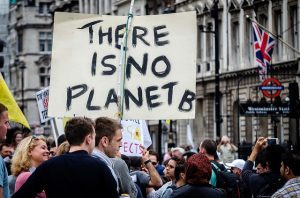


Yemen, terra incognita
26 November 2018
Cogito n°5
27 November 2018From the content of our plates to that of international summits, not to mention fields, the environmental crisis is omnipresent. In response to the gravity of the issues it raises, over twenty Sciences Po researchers across all disciplines created the Interdisciplinary workshop for research on the environment to analyze its many dimensions and consider ways to address them.
The contributions selected for this issue illustrate the focus areas of the conducted research: governance, lifestyle and health, so-called “natural” disasters, and finally the need to think collectively!
- Environmental policymaking: the case of China. In 2014, Xi Jinping, president of the world’s largest CO2 emitter, declared a war on pollution. But how can this battle be waged at a time when demographic and economic growth are still on an upward trajectory – and will continue to be so for a long time? Can an authoritarian regime consider all the stakeholders, including civil society? Richard Balme analyzes this by tracing the ebbs and flows of China’s advances, which are insufficient but real.
- Responsible consumption: what can the consumer do? If China is polluting so much, isn’t it also because of our unbridled consumption of “cheap” products? Less and better consumption, recycling, short supply chains, and “sustainable” and socially responsible production are some of the paths that our societies are pursuing. The author of a reference book on responsible consumption, Sophie Dubuisson-Quellier, dissects the tenets and achievements of this movement, which has not yet had its final word.
- Frugal cities: between “business as usual” and decline? Consuming less, economizing, and recycling resources are objectives that many cities share. By analyzing examples of policies conducted in this area by major cities of the North and South, Charlotte Halpern highlights their operations, economic stakes, and political motivations. She also examines their results, which fall well short of goals.
- Fault lines: earthquakes and historical change. Natural catastrophes remind us of the extent to which out societies are vulnerable to natural forces that surpass us. However, beyond the havoc they wreak, these events have a run-up and aftermath that we can control. Giacomo Parrinello explores the impact of historic earthquakes analyzes arrangements made in their wake. This is relevant at a time when we know that the number of “natural” catastrophes will grow.
- Pesticides and human health: between toxicology and epidemiology. The use and impact of chemical pesticides top concerns about pollution. While they have a proven deleterious effect on the ecosystem, their effects on human health are the subject of great controversy. Some assert they are harmful while others doubt it. But the former are referring to epidemiology, and the latter, to toxicology. In his article, Jean-Noël Jouzel explains how and why these two groups talk past each other.
- Thinking together (and at the same time) about Earth equally! All types of approaches need to cross-pollinate to address our environmental emergency. Bernard Reber has made this cause his own by calling for a collective intelligence bringing together politicians, researchers from all disciplines, and civil society.
More
- Directory of researchers, research engineers, and PhD students working on environmental issues
- A few research projects
- The carbon footprint of French households and international trade
- Renewable energy and the structuring of sectors in Europe
- What are the paths to decarbonization?
- When history studies ecosystems
- Will Paris become a green city?
- Understanding the Mediterranean salt giant via multidisciplinary research





